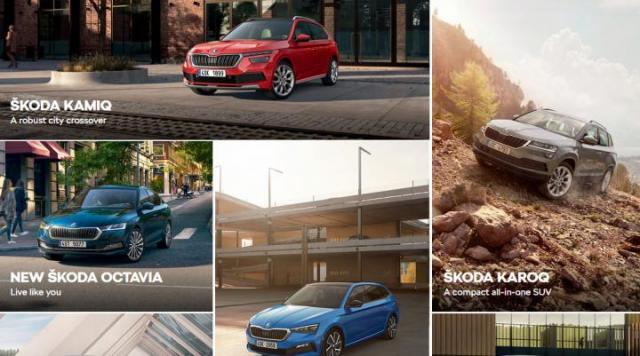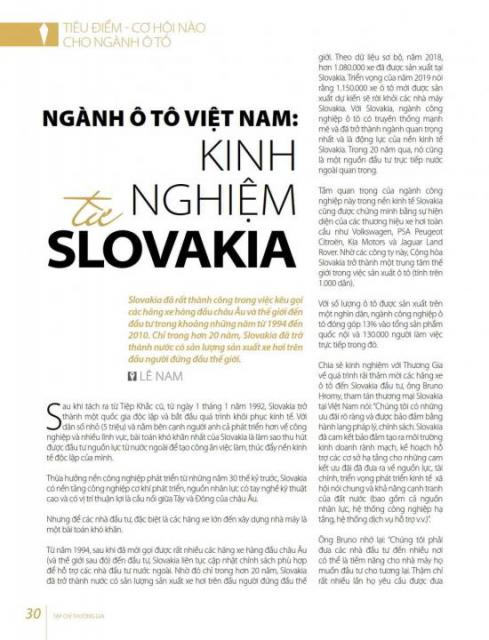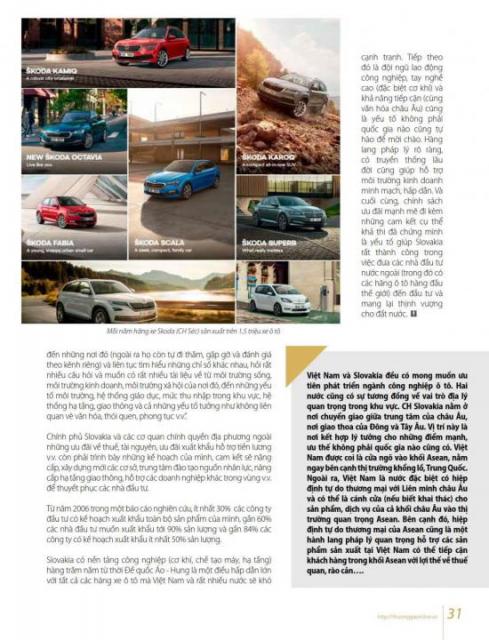VIETNAM AUTOMOBILE INDUSTRY: Slovakia Experience
After separating from the former Czechoslovakia, on January 1, 1992, Slovakia became an independent country and began the process of economic recovery. With a small population (5 million) and located next to the older brother who is more developed in industry and many fields, Slovakia's most difficult problem is how to attract investment resources from abroad to create jobs, jobs and promote its independent economy.
Inheriting the developed industry since the 30s of the last century, Slovakia has a well-developed mechanical industry background, highly skilled human resources and a favorable position as a bridge between the West and East of Europe.
But getting investors, especially big car companies to build factories here is a difficult problem.
Since 1994, after inviting many leading car manufacturers in Europe (and the world afterwards) to invest, Slovakia has continuously updated appropriate policies to support foreign investors. Thanks to that, in just over 20 years, Slovakia has become the country with the leading car production per capita in the world.
According to preliminary data, in 2018, more than 1,080,000 vehicles were produced in Slovakia. The outlook for 2019 states that 1,150,000 newly produced cars are expected to leave the Slovak factories.
For Slovakia, the automotive industry has a strong tradition and has become the most important industry and the driving force of the Slovak economy. Over the past 20 years, it has also been an important source of foreign direct investment.
The importance of this industry in the Slovak economy is also evidenced by the presence of global car brands such as Volkswagen, PSA Peugeot Citroën, Kia Motors and Jaguar Land Rover. Thanks to these companies, the Slovak Republic became a world center for the production of automobiles (per 1,000 inhabitants).
With the number of cars produced per thousand inhabitants, the auto industry contributes 13% to the gross domestic product and 130,000 people work directly in it.
Sharing experiences with Traders about the process of carpeting inviting car manufacturers to Slovakia to invest, Mr. Bruno Hromy, Slovak commercial counselor in Vietnam said: “We have clear and guaranteed incentives, through legal and policy corridors. Slovakia has committed to ensuring a transparent business environment, plans to support the infrastructure for the preferential commitments made in terms of resources, finance, prospects for socio-economic development in general. and competitiveness of the country (including human resources, industrial infrastructure system, supporting service system etc.)”.
“We had to take investors to many places where there could be potential for the factory they wanted to invest in for the future. Even many times they asked to be taken repeatedly to those places (in addition, they also visited, met and assessed on their own channels) and continuously studied different indicators, asked a lot of questions and wanted there is a lot of material about the living environment, business environment, social environment of that place, to environmental factors, education system, income level in the area, infrastructure system, transportation and even seemingly unrelated factors related to culture, habits, customs, etc.”.
Slovak government and local government agencies in addition to tax incentives, natural resources, export incentives, salary support, etc also have to present their plans, commit to upgrading and building new facilities, human resource training centers, upgrading transport infrastructure, supporting other businesses in the region, etc. to convince investors.
Since 2006 in a research report, at least 30% of investment companies plan to export their entire products, almost 60% of investors want to export up to 90% of production and almost 84% companies that plan to export at least 50% of their production.
Slovakia has an industrial background (mechanical, manufacturing, infrastructure) hundreds of years from the time of the Austro-Hungarian Empire, which is a great attraction for all car manufacturers that Vietnam and many other countries will find difficult to compete.
Next plus is a team of industrial workers, highly skilled (especially mechanical) and accessible (with European culture) which is also a factor not every country is proud to offer.
A clear legal framework with a long tradition also helps to support a transparent and attractive business environment. And finally, strong preferential policies with specific feasible commitments have proven to be the factors that make Slovakia very successful in bringing in foreign investors (including the world's leading car manufacturers) to invest and bring prosperity to the country.
Nam Le / Svcc
- Slovak newlyweds conquer Latin America in the ‘ugliest car in the world’
- Priest’s 1880 book leads to discovery of forgotten settlement and trade route
- New highway sticker prices set to rise
- What will the proposed transaction tax mean for you?
- Fico finally takes steps to consolidate: late and flawed, but it could have been worse
- Top 10 events in Bratislava for foreigners
- 3 things to do in Bratislava for free in the next seven days
- News digest: Border village left stranded as Danube rises
- Oldest canoe club in Bratislava celebrates centenary, then battles floods
- Culture minister blames former National Gallery director once again, this time for water leaks
- Minister Kamenický’s planned book VAT hike faces fierce backlash from all sides
- Slovak Matters: in praise of burčiak
- Weighing more than 5,000 elephants, this bridge is paratroopers and filmmakers’ favourite
- News digest: Buy books? Minister says you’re wealthy and should pay more for them
- News digest: Read books? Minister says you’re wealthy and should pay more for them
- Opposition leader Šimečka removed as deputy speaker, but remains unshaken
- “It’s a must”: How PM Fico plans to fix Slovakia’s public finances
- Slovak-Belgian team unearths extinct lizard in Europe—a species once known only from the US









